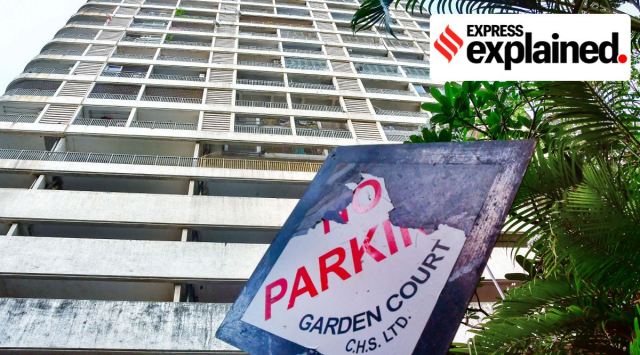Explained: Properties linked to Shiv Sena, AAP leaders attached, what happens to them now?
The Enforcement Directorate has attached assets linked Shiv Sena MP Sanjay Raut and Delhi Minister Satyendra Jain. What does the law say on the attachment of property?
 The Garden Court CHS Ltd. property of Shiv Sena MP Sanjay Raut that Enforcement Directorate has attached in a money laundering case, at Dadar in Mumbai, Tuesday, April 5, 2022. (PTI Photo)
The Garden Court CHS Ltd. property of Shiv Sena MP Sanjay Raut that Enforcement Directorate has attached in a money laundering case, at Dadar in Mumbai, Tuesday, April 5, 2022. (PTI Photo)The Enforcement Directorate (ED) on Tuesday (April 5) moved against two prominent Opposition leaders, Shiv Sena MP Sanjay Raut, and AAP leader and Delhi Minister Satyendra Jain.
In Mumbai, the agency provisionally attached assets worth Rs 115 crore linked to three persons, including Raut’s wife Varsha Raut.
Separately in Delhi, the ED attached assets worth Rs 4.81 crore belonging to five companies allegedly linked to Jain and his relatives.
In both these cases, the central agency moved under the Prevention of Money Laundering Act (PMLA).
The ED has taken similar action earlier against other politicians as well, including former Jammu and Kashmir Chief Minister Farooq Abdullah in January 2021 and Sivaganga MP Karti Chidambaram, the son of former Union Minister and senior Congress leader P Chidambaram, in October 2018.
In Farooq’s case (related to the investigation into alleged money laundering in a case related to the Jammu and Kashmir Cricket Association), the attached properties included his Gupkar Road residence in Srinagar, where he was then resident, and two other residential properties in Tangamarg and Sunjwan, apart from commercial properties on Srinagar’s Residency Road.
In Karti’s case (related to the INX Media case), immovable properties worth over Rs 50 crore were attached, including a bungalow in Somerset, United Kingdom, a tennis club in Barcelona, Spain, agricultural land in Kodaikanal, a bungalow in Ooty, and 50% of a house owned by Karti and his mother Nalini in Jor Bagh, New Delhi.
🗞️ Subscribe Now: Get Express Premium to access the best Election reporting and analysis 🗞️
What happens when ED attaches the property of an accused?
Does it mean that individuals such as Raut, Jain, or anyone else, are immediately locked out of these homes or offices?
Not necessarily. Provisional attachment orders issued by the ED do not lead to immediate sealing of a property.
Farooq Abdullah, for example, continued to live in his house while the matter remained pending in courts. The Chidambaram family too, continued to enjoy their property in New Delhi even after 50% of it was attached. In 2020, the ED had issued an eviction notice to Karti, who secured legal protection against it.
 Sanjay Raut and Satyendra Jain (File Photos)
Sanjay Raut and Satyendra Jain (File Photos)
For how long is the ED’s attachment order valid?
The ED’s provisional attachment order is valid for 180 days, during which time it must be confirmed by the Adjudicating Authority under the Prevention of Money Laundering Act (PMLA). If it is not confirmed, the property is automatically released from attachment.
If it is confirmed, the accused can challenge the confirmation in the Appellate Tribunal within 45 days, and subsequently in the concerned High Court and the Supreme Court.
What does the law say on the attachment of property?
The purpose of attachment is to deprive an accused of the benefits of the attached asset. The law also provides for the property to remain out of bounds for the accused until the trial is complete.
However, properties that are in use are generally not sealed until the case reaches its logical conclusion. Usually, the accused secures release of the property in appellate tribunals or High Courts, or is able to get a stay, and continue to enjoy it while the matter remains pending in the courts.
What about running businesses?
Running businesses are not shut down. Therefore, a running hotel can, for example, be attached under the PMLA, and still continue its business.
In 2018, the ED attached the Holiday Inn Hotel at Delhi’s IGI airport in connection with the Air India case. But the hotel continues to host guests as usual.
The law provides for the resting of operational profits with the ED. But businesses can get a stay on this from the courts, for the matter to be finally decided in the eventual outcome of the case.
On what basis does the ED attach the properties of accused persons?
Under PMLA, proceeds of crime, that is money that is generated out of a criminal activity, is attached on the directions of the ED Director. However, if that wealth is not available for attachment, the agency can attach property equivalent to that value.
The PMLA defines “proceeds of crime” as “any property derived or obtained, directly or indirectly, by any person as a result of criminal activity relating to a scheduled offence or the value of any such property, or where such property is taken or held outside the country, then the property equivalent in value held within the country or abroad”.
While the idea of attachment of property equivalent to proceeds of crime has been contested, various court orders in the past have ruled in favour of ED’s interpretation of the term “the value of any such property” to mean that the agency can attach any property of equivalent value with the accused.
The law also has a provision for the attachment of local property of equivalent value if investigations reveal that the accused has parked proceeds of crime abroad, and the same cannot be attached there.
What happens to assets that are sealed?
Attached properties may remain locked for years, and may start crumbling. There is a provision for a body to maintain such properties, but it has not been set up yet.
Attached vehicles are sent to warehouses owned by the Central Warehousing Corporation, where the ED pays to park the vehicle. As cases drag on for years, the vehicles rot. At the end of the trial, neither the accused nor the ED recovers anything from the vehicle. The agency could, in fact, end up paying more rent than the value of the vehicle.
Newsletter | Click to get the day’s best explainers in your inbox
- 01
- 02
- 03
- 04
- 05







































